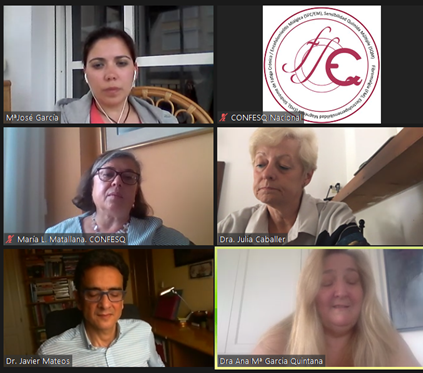QUESTIONS FROM EMEA IN THE WEBINAR «COVID and the diseases represented by CONFESQ»

Preguntas de EMEA en el webinar «COVID y enfermedades representadas por CONFESQ»
El pasado 27 de mayo y con motivo del día mundial de Encefalomielitis Miálgica /Síndrome de Fatiga Crónica, Fibromialgia, Sensibilidad Química Múltiple y Electrohipersensibilidad, CONFESQ celebró la última de un ciclo de conferencias para la concienciación y puesta en conocimiento de estas 4 enfermedades. En esta ocasión, el tema del webinar era el “COVID y enfermedades representadas por CONFESQ”, en el que participaron médicos clínicos conocedores de nuestras enfermedades, representando la medicina pública y privada, y la atención primaria y especializada: Dra. Ana Mª García Quintana, Dr. Javier Mateos y Dra. Julia Caballer.
Además, pudimos contar con la participación de la organización europea de Encefalomielitis Miálgica más relevante, European ME Alliance (EMEA), de la que es miembro CONFESQ.
La directiva de EMEA, interesados por nuestras actividades programadas con motivo del 12 de mayo, nos hizo llegar unas preguntas relacionadas con la EM/SFC y la COVID19. Las preguntas que nos enviaron fueron:
- ¿Quién asume la responsabilidad de los pacientes con Covid persistente? ¿Qué especialidad se utiliza para la derivación?
- ¿Existe una vía especial de atención para los pacientes con Covid persistente y en qué se diferencia de la de los pacientes con EM/SFC?
- ¿Ve alguna diferencia entre los pacientes con Covid persistente y Encefalomielitis Miálgica? ¿Y a cuántos pacientes con Covid persistente están tratando los médicos utilizando la experiencia obtenida con aquellos pacientes con EM/SFC?
- ¿Ha cambiado la percepción de EM/SFC debido a las experiencias de tratamiento con pacientes con Covid persistente?
- ¿Espera ver un aumento en el número de especialistas que tratan Covid persistente? ¿Y esto se traduciría en un incremento de la mejora en el tratamiento de los pacientes con EM/SFC?
Si quieres saber qué respondieron los doctores, pincha en el vídeo que se muestra a continuación (español, subtítulos en inglés):
Actividades como esta, son de gran importancia porque no solo ayudan a mejorar la colaboración entre entidades a nivel europeo, sino que también fomentan el conocimiento y experiencia de la Encefalomielitis Miálgica.
Y sí aún no has visto el webinar completo puedes visualizarlo aquí (español):
Questions from EMEA in the webinar «COVID and the diseases represented by CONFESQ»
On May 27th and on the occasion of the world day of Myalgic Encephalomyelitis/Chronic Fatigue Syndrome, Fibromyalgia, Multiple Chemical Sensitivity and Electrohypersensitivity, CONFESQ held the last of a series of conferences to raise awareness and knowledge of these 4 diseases. On this occasion, the theme of the webinar was «COVID and the diseases represented by CONFESQ», with the participation of clinicians knowledgeable about our diseases, representing public and private medicine, and primary and specialised care: Dr. Ana Mª García Quintana, Dr. Javier Mateos and Dr. Julia Caballer.
In addition, we were able to count on the participation of the most relevant European organisation for Myalgic Encephalomyelitis, the European ME Alliance (EMEA), of which CONFESQ is a member.
The EMEA board, interested in our activities planned for 12 May, sent us some questions related to ME/CFS and COVID19. The questions they sent us were:
- Who takes responsibility for Long Covid patients? What speciality is used for referral?
- Is there a care pathway for Long Covid patients and how is this different from ME patients?
- Do you see any differences between Long Covid and ME patients and how much are clinicians treating Long Covid using expertise gained from those treating ME?
- Has the perception of ME changed due to experiences of treating Long Covid patients?
- Do you expect to see a rise in the number of specialists treating Long Covid to rise and would there be an equal effort in treating ME patients?
If you want to know what the doctors answered, click here (English subtitles):
Activities like this are of great importance because they not only help to improve collaboration between organisations at the European level, but also promote the knowledge and experience of Myalgic Encephalomyelitis.
And if you haven’t seen the full webinar yet, you can watch it here (Spanish):

